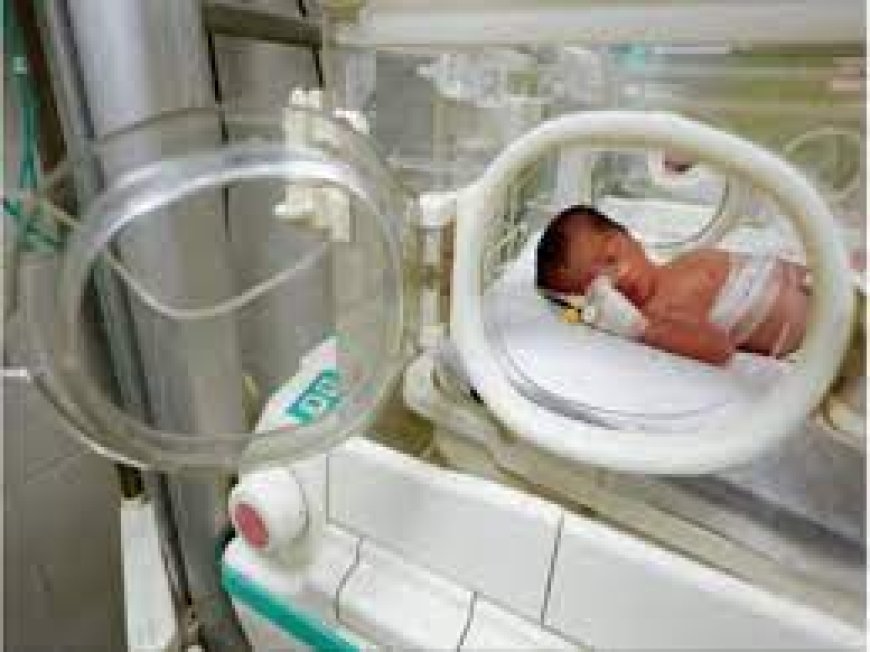Baby saved from dead mother's womb after Israeli strike

SABREEN was dead before she could look into the baby's eyes or hold her.
The young mother had carried her child through seven-and-a-half months of pregnancy. They were days and nights of constant fear, but Sabreen hoped the family's luck would hold until the war ended.
That luck vanished in the roar and fire of an explosion in the hour before midnight on 20 April.
The Israelis dropped a bomb onto the al-Sakani family home in Rafah where Sabreen, along with her husband and the couple's other daughter - three-year-old Malak - were asleep.
Sabreen suffered extensive injuries and her husband and Malak were killed, but the baby was still alive in her mother's womb when rescue workers reached the site.
They rushed Sabreen to hospital, where doctors performed an emergency Caesarean section to deliver the child.
Sabreen could not be saved but doctors worked to resuscitate the baby, gently tapping her chest to stimulate breathing. Air was pumped into her lungs.
"She was born in severe respiratory distress," said Dr Mohammed Salama, head of the emergency neo-natal unit at Emirati Hospital in Rafah.
But the baby - who weighed just 1.4kg (3.1 lbs) - survived the ordeal of her birth.
The doctor wrote the words "the baby of the martyr Sabreen al-Sakani" on a piece of tape and attached it to her body. She was then placed in an incubator.
"We can say there is some progress in her health condition," Dr Salama said.
"But the situation is still at risk. This respiratory distress syndrome is originally caused by premature birth. This child should have been in the mother's womb at this time, but she was deprived of this right."
The doctor expects her to remain in hospital for up to a month.
"After that, we will see about her leaving…here is the biggest tragedy. Even if this child survives, she was born an orphan," Dr Salama said.
There were no parents left to name the baby. Her dead sister Malak had wanted her to be called Rouh, which means soul or spirit in Arabic. But she has been called Sabreen, in memory of her mother.
Surviving family members gathered at the hospital, caught between the practicalities of creating a new family life for orphaned baby Sabreen and their grief and anger.
The baby's maternal grandmother, Mirvat al-Sakani, spoke of the "injustice and slander" of what had happened to people who "have nothing to do with anything".
"My daughter was pregnant and had a foetus in her body, and her daughter is with her, and my son was also with them," she said.
"My son became body parts and they have not found him yet. They do not recognise him… why are they targeting them? We don't know why, how. We do not know… they only target women and children."
The baby's uncle, Rami al-Sheikh, said her father had worked with him as a barber.
"What's their fault, a whole family wiped from the civil registry and the only survivor is a small baby girl?" he asked.
"These are ordinary civilians."
Sabreen's paternal grandmother, Ahalam al-Kurdi, promised that she would raise the child. "She is my love, my soul. She is a memory of her father. I will take care of her."
The Hamas run Health Ministry in Gaza says that of 34,000 people killed in Gaza since the war began on 7 October, at least two-thirds are women and children.
Israel launched its offensive after about 1,200 Israelis and foreigners - mostly civilians - were killed and 253 others were taken back to Gaza as hostages, according to Israeli tallies.
The Israeli military insists it does not target civilians and has accused Hamas of using the population as a human shield.
The Israeli air strikes on Rafah on the night of 20 April also killed 15 children from the extended al-Aal family.
The father of several of the children, Abed al-Aal, said his identity had been erased as all of his children and his wife were killed.
"Show me one man among them. They are all children and women," he said.
An Israeli military statement sent to the BBC after the strikes said: "At the given times, the IDF struck several military targets of the terrorist organisations in Gaza including military compounds, launch posts and armed terrorists."
There are now an estimated 1.4 million people crowded into Rafah having been told by the Israeli Defence Forces to move south to safety earlier in the war.
But in recent days, speculation has grown that Israeli forces will enter Rafah soon to continue the fight against Hamas.
The US has appealed to Israel to adopt a targeted approach rather than launch a full-scale invasion of Rafah, which might precipitate a major humanitarian crisis.
